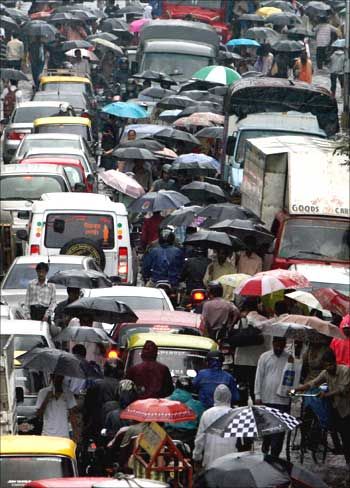The city has challenges, mainly in the areas of basic infrastructure such as roads, high quality water supply, Metro system and cheap housing -- prerequisites to attract investments and human capital.

Maharashtra Chief Minister Devendra Fadnavis promised to take on competition from any state in the process of setting up an international finance centre.
However, experts said the lack of basic infrastructure, like roads and housing, would hamper Mumbai’s chances of boasting an IFC.
During a Make in India Week event in Mumbai, Fadnavis said the city had every ingredient to make Mumbai an IFC.
“The IFC is a doable and an achievable goal. . . even if we are not the first, we have lots of advantages,” Fadnavis said.
Maharashtra’s rival Gujarat is setting up a world-class city near Ahmedabad called the GIFT City.
Some of India’s top financial companies have already taken space in GIFT City to set up their offices.
But Ahmedabad’s gain could be Mumbai’s loss, even though Fadnavis’ plan is to convert the Bandra-Kurla Complex into an IFC with separate tax regulations.
Experts said this would not be easy, though Mumbai is for all practical purposes the primary financial hub in India.
For example, the city already has all the prerequisites, including regulators, stock exchanges, commodity exchanges, mutual funds, investment banks and a talent pool, among others.
Besides, the city already offers easy access to the latest financial instruments.
The city is also a hub of forex transactions, houses the major stock markets and offers the latest facilities in the money market.
Treasuries of all major banks operate from Mumbai.
Location was not important in contemporary time but such infrastructure would add to the strength of Mumbai as a financial centre, said experts.
But the city has challenges, mainly in the areas of basic infrastructure such as roads, high quality water supply, Metro system and cheap housing -- prerequisites to attract investments and human capital.
Congestion on roads has become chronic and the time taken to commute is almost double the global average.
Besides, property prices are high, causing firms to move out to other locations.
D R Dogra, MD & CEO of CARE Ratings, said: “These issues have to be addressed as soon as possible.
"Because while the trickle-away is slow today, it could accelerate as other states provide comparable, if not better, facilities.”
Also, he said, there was a need for hotels close to the business hubs to make it accessible to foreign investors who see Mumbai as an international financial centre.
Economist Percy Mistry, who headed a committee in 2005 to suggest ways to make Mumbai an IFC, had said last year, unless Mumbai became a truly global city on the lines of New York and London, it could never succeed.
The report’s suggestions were never implemented.
Interestingly, experts said if GIFT City was developed the way it had been envisaged, new business, especially in the exports and IT spaces, might move there.
“However, it looks unlikely that any other city will be able to take over as the financial centre, as Mumbai still has the cosmopolitan advantage as well as history to ensure that it is the preferred destination.
"And to my mind, GIFT is not being developed to immediately take on this role and the way it develops will determine its potential to do so in future,” added Dogra.
Image: Traffic snarls are a daily sight in Mumbai. Photograph: Reuters











